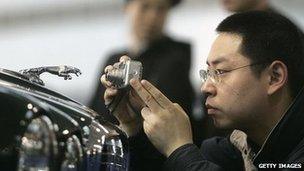Doing Business in China
- Published

Des Thurlby talks about his experience of working in China
Des Thurlby has been director of human resources at Jaguar Land Rover since 2007, and helped negotiate the establishment of the firm's first overseas manufacturing joint venture, in mainland China.
I have always been fond of China, having gone there on holiday from time to time over the years, but it wasn't until a couple of years ago that I started going on business trips there for Jaguar Land Rover.
I immediately found the pace, the buzz and the excitement of the place intoxicating. The market there is growing extremely fast, so obviously there are huge opportunities, especially for upmarket Western brands.
They simply love British luxury marques, with all their heritage and design history, and they want it all right away.
In spite of this, though, I soon learned that you have to be patient to do business in China.
Negotiate differently
To begin with I found it daunting to operate in a country with a culture so dramatically different from that in the West.
Everyone in business here is very considered and thoughtful, and they are very long-term in their outlook. You can't just fly into China in the morning and expect decisions by the afternoon, then leave.
Meetings are very disciplined and everyone's very formal and polite, so I've had to learn to negotiate differently. It is vital that your opposite number does not lose face, so banging the table to get things done simply doesn't work. All negotiations must be win-win.
One thing I learned early on is that when they ask a question, you'll have to go back [to them] to find out what they're actually concerned about. To them, asking questions is a way of exploring broader issues, so I'm always trying to work out what they actually want to know.
At the end of the day, we want the same thing, though: They want us to make cars in China and so do we.

The Chinese "simply love British marques"
We're working with Chery Automobile, one of the biggest carmakers here, on a joint venture to assemble cars in China.
Negotiations have been concluded and we're waiting for government approval, so we're in the hands of Beijing now. But the authorities really want us to invest in China, so I'm pretty optimistic about the outcome.
Made in China
It's been great to see how we've evolved in China. We started out out as a sales organisation, importing cars from Britain. But demand is growing so fast that we could do with local production capacity.
All our competitors are also localising, and that's another reason why we'll need to do it. Imported cars are more expensive than locally-made cars because of high tariffs and duties, so if we don't make cars locally we won't be able to compete.
To begin with, we'll start with paint shops and an assembly line, though the cars won't be made from scratch in China. Design and research and development will stay in the UK, which is important given our identity as a British carmaker. Chinese authorities and customers recognise that Jaguars and Land Rovers are British designs.
In time we'll probably do more in China, though, such as making engines, and perhaps we'll do some R&D as well.
But it's important to point out that we're not shifting capacity from Britain; we're expanding at home too and about 80% of the cars we make there are exported to markets around the world. Anything we do in China comes in addition.
Better understanding
Expanding in China obviously means we'll need more and more Chinese people to come and work for us. Recruitment is done in very different ways here, though, and there's a real war for talent, so we have to do all we can to attract and hang onto the best people.

Many of them are very ambitious and extremely hard working, and they expect the same from you. If you don't deliver, they'll go somewhere else.
And it's not all about pay either. The family is very important here, and with the one child policy you'll often see one young person supporting two sets of grandparents.
So as an employer, we do a lot for the families of our employees, for instance family fun days such as go-carting or football matches, or community activities such as helping decorate local schools.
Many of our young employees get married while working for us, and we like to let them have a Jaguar with a chauffeur as a wedding car.
Education and training is also both welcomed and expected; they just love to develop as people, and obviously we're keen to train our workforce and encourage good engineering or management.
We are increasingly promoting Chinese staff into our senior management teams, not least because they understand the market and the consumer better, and many of them come to the UK to learn about the company and the country the cars come from.
It is absolutely clear to me that the better we get to know one another the more we can learn from each other, and everybody will benefit.
The opinions expressed are those of the author and are not held by the BBC unless specifically stated.